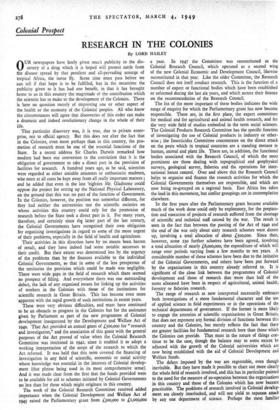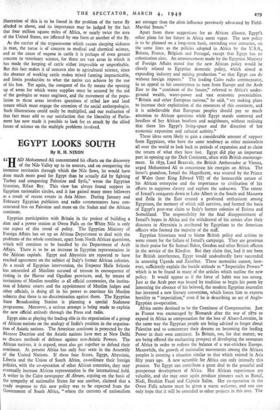Colonial Prospect
RESEARCH IN THE COLONIES
By LORD BAILEY
OUR newspapers have lately given much publicity to the dis- covery of a drug which it is hoped will protect cattle from the disease spread by that pestilent and all-pervading scourge of tropical Africa, the tsetse fly. Some time must pass before we can tell if that hope is to be fulfilled, but in the meantime the publicity given to it has had one benefit, in that it has brought home to us in this country the magnitude of the contribution which the scientist has to make to the development of the Colonies. There is here no question merely of improving one or other aspect of the health or the economy of the Colonial peoples. All who know the circumstances will agree that discoveries of this order can make a dramatic and indeed revolutionary change in the whole of their life.
That particular discovery was, it is true, due to private enter- prise, not to official agency. But this does not alter the fact that in the Colonies, even more perhaps than in this country, the pro- motion of research must be one of the essential functions of the State. In a recent address Sir Charles Darwin remarked how modern had been our conversion to the conviction that it is the obligation of government to take a direct part in the provision of facilities for research. A hundred years ago, as he said, scientists were regarded as either amiable amateurs or enthusiastic madmen, who must at all costs be kept away from all really important matters ; and he added that even in the late 'eighties Mr. Gladstone could oppose the project for setting up the National Physical Laboratory, on the ground that this was no part of the function of Government. In the Colonies, however, the position was somewhat different, for they had neither the universities nor the scientific societies on whose activities this country could rely for the promotion of research before the State took a direct part in it. For many years, therefore, and certainly since the latter part of the last century, the Colonial Governments have recognised their own obligation for organising investigations in regard to some of the more urgent of their problems, especially in the field of health and agriculture.
Their activities in this direction have by no means been barren of result, and they have indeed had some notable successes to their credit. But their extent was determined less by the urgency of the problems than by the finances available to the individual Colonial Governments, so that in some of the less prosperous of the territories the provision which could be made was negligible. There were wide gaps in the field of research which there seemed no prospect of filling. And everywhere there was one outstanding defect, the lack of any organised means for linking up the activities of workers in the Colonies with those of the institutions for scientific research in Great Britain. This has become even more apparent with the rapid growth of such institutions in recent years.
These were very obvious difficulties, and must have continued to be an obstacle to progress in the Colonies but for the assistance given by Parliament as part of the new programme of Colonial development inaugurated by the Development and Welfare Act of 1940. That Act provided an annual grant of £500,000 for " research and investigation," and the association of this grant with the general purposes of the Act proved of value when the Colonial Research Committee was instituted in 1942, since it enabled it to adopt a working interpretation of the scope of the research to which the Act referred. It was held that this term covered the financing of investigation in any field of scientific, economic or social activity where knowledge was essential in the interests of Colonial develop- ment (that phrase being used in its most comprehensive sense). And it was made clear from the first that the funds provided were to be available for aid to schemes initiated by Colonial Governments no less than for those which might originate in this country.
The work of the Colonial Research Committee received added importance when the Colonial Development and Welfare Act of 1945 raised the Parliamentary grant from £500,000 to Li,o0o,000 a year. In 1947 the Committee was reconstituted as the Colonial Research Council, which operated as a second wing of the new Colonial Economic and Development Council, likewise reconstituted in that year. Like the older Committee, the Research Council does not itself conduct research. This is the function of a number of expert or functional bodies which have been established or reformed during the last six years, and which secure their finance on the recommendation of the Research Council.
The list of the more important of these bodies indicates the wide range of enquiry for which the Parliamentary grant has now become responsible. There are, in the first place, the expert committees for medical and for agricultural and animal health research, and for the very wide field of studies embodied in the term social sciences. The Colonial Products Research Committee has the specific function of investigating the use of Colonial products in industry or other- wise ; the Insecticides Committee concentrates on the direct attack on the pests which in tropical countries are a standing menace to human, animal and plant life. There are, in addition, the functional bodies associated with the Research Council, of which the most prominent are those dealing with topographical and geophysical surveys, geological survey, fisheries and the operations for inter- national locust control. Over and above this the Research Council helps to organise and finance the research activities for which the Colonial Governments themselves are responsible, and which are now being re-grouped on a regional basis. East Africa has taken the lead in this movement, but similar groupings are in contemplation elsewhere.
In the first years after the Parliamentary grant became available much of the work done could only be exploratory, for the prepara- tion and execution of projects of research suffered from the shortage of scientific and technical staff caused by the war. The result is seen in the fact that between the passing of the Act of 1940 and the end of the war only about sixty research schemes were drawn up, involving a total allocation of about L500,00o. Since then, however, some 23o further schemes have been agreed, involving a total allocation of nearly £6,000poo, the expenditure of which will range over periods varying from a few months to ten years. A considerable number of those schemes have been due to the initiative of the Colonial Governments, and others have been put forward by the organisations in this country already referred to. It is significant of the close link between the programmes of Colonial development and those of research that more than half of the sums allocated have been in respect of agricultural, animal health, forestry or fisheries research.
The range of research as now interpreted necessarily embraces both investigations of a more fundamental character and the use of applied science in field experiments or in the operations of the technical departments of government. If the former is more likely to engage the attention of scientific organisations in Great Britain, that does not represent any formal division of functions between this country and the Colonies, but merely reflects the fact that there are greater facilities for fundamental research here than those which the Colonies can provide. That must in the nature of things con- tinue to be the case, though the balance may to some extent be adjusted with the growth of the Colonial universities which are now being established with the aid of Colonial Development and Welfare funds.
The delays imposed by the war are regrettable, even though inevitable. But they have made it possible to chart out more clearly the whole field of research involved, and this has in particular pointed to the need for the measure of co-operation between the organisations in this country and those of the Colonies which has now become practicable. The problems of research involved in Colonial develop- ment are closely interlocked, and will not yield to separate attack by any one department of science. Perhaps the most familiar illustration of this is to be found in the problem of the tsetse fly alluded to above, and its importance may be judged by the fact that four million square miles of Africa, or nearly twice the area of the United States, are infested by one form or another of the fly.
As the carrier of the trypanosome which causes sleeping sickness in man, the tsetse is of concern to medical and chemical science, and as the cause of nagana in cattle it is perhaps of even greater concern to veterinary science, for there are vast areas in which it has made the keeping of cattle either impossible or unprofitable. But this fact makes it of concern also to agricultural science, since the absence of working cattle makes mixed farming impracticable, and limits production to what the native can achieve by the use of his hoe. Yet again, the conquest of the fly means the opening up of areas for which water supplies must be secured by the aid of the geologist or water engineer, and the movement of the popu- lation to those areas involves questions of tribal law and land tenure which must engage the attention of the social anthropologist. Such illustrations could easily be multiplied, and our realisation of that fact must add to our satisfaction that the liberality of Parlia- ment has now made it possible to look for an attack by the allied forces of science on the multiple problems involved.







































 Previous page
Previous page